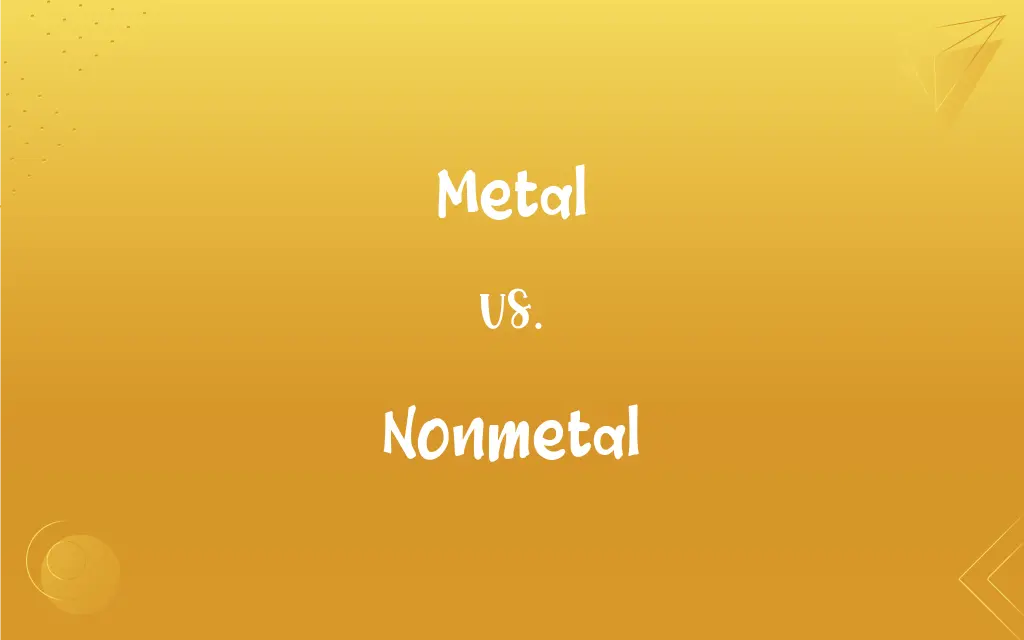Metal vs. Nonmetal: What's the Difference?
Edited by Aimie Carlson || By Janet White || Updated on October 11, 2023
Metals are typically shiny, malleable, and conductive, while nonmetals usually are dull, brittle, and insulators.

Key Differences
Metals exhibit qualities such as malleability and ductility, which allow them to be reshaped without breaking. Nonmetals, in stark contrast, are generally brittle and cannot be reshaped or drawn into wires as metals can.
Metals are generally good conductors of electricity, providing a passage for electric currents with ease. Nonmetals, conversely, tend to be poor conductors, resisting the flow of electrical currents and often acting as insulators.
Metals tend to have a shiny or lustrous appearance, reflecting light effectively. Nonmetals, on the opposite end, do not have this metallic luster and frequently appear dull or matte in aesthetic appeal.
Metals usually display high melting and boiling points, meaning they can remain solid at higher temperatures. Nonmetals, however, usually have lower melting and boiling points, often existing as gases or fragile solids at room temperature.
Metals tend to form positive ions by losing electrons during chemical reactions, showcasing their electropositive character. Nonmetals, in comparison, usually gain electrons, forming negative ions, thus demonstrating their electronegative nature.
ADVERTISEMENT
Comparison Chart
Electrical Conductivity
Good conductor
Poor conductor
Malleability
Malleable
Brittle
Luster
Shiny
Dull
Electron Transfer
Loses electrons
Gains electrons
Physical State
Often solid
Can be gaseous or solid
ADVERTISEMENT
Metal and Nonmetal Definitions
Metal
A metal is a hard, shiny material that conducts heat and electricity.
Iron, a metal, is used to construct bridges.
Nonmetal
Nonmetals usually form negative ions by gaining electrons.
Oxygen, a nonmetal, forms oxide ions in reactions.
Metal
Metals can lose electrons and form positive ions in reactions.
Sodium, a metal, loses an electron to become positively charged.
Nonmetal
Nonmetals can exist in multiple physical states at room temperature.
Bromine, a nonmetal, is liquid at room temperature.
Metal
Metals are typically malleable and ductile.
Copper, a metal, is often drawn into wires.
Nonmetal
Nonmetals generally lack the luster that metals possess.
Carbon, a nonmetal, appears dull and black in its graphite form.
Metal
Metals often form metallic bonds with other metals.
Alloys like bronze contain copper, a metal, mixed with tin.
Nonmetal
Nonmetals are typically poor conductors of heat and electricity.
Sulfur, a nonmetal, is used in the vulcanization of rubber.
Metal
Any of a category of electropositive elements that usually have a shiny surface, are generally good conductors of heat and electricity, and can be melted or fused, hammered into thin sheets, or drawn into wires. Typical metals form salts with nonmetals, basic oxides with oxygen, and alloys with one another.
Nonmetal
Nonmetals typically have lower melting and boiling points than metals.
Iodine, a nonmetal, sublimates directly from solid to vapor.
Metal
An alloy of two or more metallic elements.
Nonmetal
Any of a number of elements, such as oxygen or sulfur, that lack the physical and chemical properties of metals.
Metal
An object made of metal.
Nonmetal
(chemistry) An element, such as phosphorus or chlorine, that does not have the chemical or physical properties of a metal.
Metal
Basic character; mettle.
Nonmetal
Any one of the set of elements which, as contrasted with the metals, possess, produce, or receive, acid rather than basic properties; a metalloid; as, oxygen, sulphur, and chlorine are nonmetals.
Metal
Broken stones used for road surfaces or railroad beds.
Nonmetal
A chemical element lacking typical metallic properties
Metal
Molten glass, especially when used in glassmaking.
Nonmetal
Not containing or resembling or characteristic of a metal;
Nonmetallic elements
Metal
Molten cast iron.
Metal
(Printing) Type made of metal.
Metal
(Music) Heavy metal.
Metal
To cover or surface (a roadbed, for example) with broken stones.
Metal
(heading) Chemical elements or alloys, and the mines where their ores come from.
Metal
Any of a number of chemical elements in the periodic table that form a metallic bond with other metal atoms; generally shiny, somewhat malleable and hard, often a conductor of heat and electricity.
Metal
Any material with similar physical properties, such as an alloy.
Metal
(astronomy) An element which was not directly created after the Big Bang but instead formed through nuclear reactions; any element other than hydrogen and helium.
Metal
Crushed rock, stones etc. used to make a road.
Metal
(mining) The ore from which a metal is derived.
Metal
(obsolete) A mine from which ores are taken.
Metal
(tincture) A light tincture used in a coat of arms, specifically argent (white or silver) and or (gold).
Metal
Molten glass that is to be blown or moulded to form objects.
Metal
(music) A category of rock music encompassing a number of genres (including thrash metal, death metal, heavy metal, etc.) characterized by strong drum-beats and distorted guitars.
Metal
The substance that constitutes something or someone; matter; hence, character or temper.
Metal
The effective power or calibre of guns carried by a vessel of war.
Metal
The rails of a railway.
Metal
The actual airline operating a flight, rather than any of the codeshare operators.
We have American Airlines tickets, but it's on British Airways metal.
Metal
(music) Characterized by strong drum-beats and distorted guitars.
Metal
Having the emotional or social characteristics associated with metal music; brash, bold, frank, unyielding, etc.
Metal
To make a road using crushed rock, stones etc.
Metal
An elementary substance, as sodium, calcium, or copper, whose oxide or hydroxide has basic rather than acid properties, as contrasted with the nonmetals, or metalloids. No sharp line can be drawn between the metals and nonmetals, and certain elements partake of both acid and basic qualities, as chromium, manganese, bismuth, etc.
Metal
Ore from which a metal is derived; - so called by miners.
Metal
A mine from which ores are taken.
Slaves . . . and persons condemned to metals.
Metal
The substance of which anything is made; material; hence, constitutional disposition; character; temper.
Not till God make men of some other metal than earth.
Metal
Courage; spirit; mettle. See Mettle.
Metal
The broken stone used in macadamizing roads and ballasting railroads.
Metal
The effective power or caliber of guns carried by a vessel of war.
Metal
Glass in a state of fusion.
Metal
The rails of a railroad.
Metal
To cover with metal; as, to metal a ship's bottom; to metal a road.
Metal
Any of several chemical elements that are usually shiny solids that conduct heat or electricity and can be formed into sheets etc.
Metal
A mixture containing two or more metallic elements or metallic and nonmetallic elements usually fused together or dissolving into each other when molten;
Brass is an alloy of zinc and copper
Metal
Cover with metal
Metal
Containing or made of or resembling or characteristic of a metal;
A metallic compound
Metallic luster
The strange metallic note of the meadow lark, suggesting the clash of vibrant blades
Metal
Metals usually exhibit high density and high melting points.
Lead, a dense metal, is used in radiation shielding.
FAQs
Are nonmetals good conductors of electricity?
No, nonmetals are generally poor conductors of electricity.
Can nonmetals be found in a gaseous state?
Yes, some nonmetals exist in a gaseous state at room temperature.
What type of ion do metals usually form?
Metals usually form positive ions.
Are metals typically lustrous?
Yes, metals typically exhibit a shiny, lustrous appearance.
Do metals tend to be malleable and ductile?
Yes, metals tend to be both malleable and ductile.
What physical state are most metals in at room temperature?
Metals are typically solid at room temperature.
How do nonmetals typically react in terms of electron transfer?
Nonmetals typically gain electrons, forming negative ions.
Do nonmetals have high melting points?
Typically, nonmetals have lower melting and boiling points than metals.
Can nonmetals be shiny?
Nonmetals are generally not shiny and exhibit a dull appearance.
Do metals have high melting points?
Generally, metals have high melting and boiling points.
About Author
Written by
Janet WhiteJanet White has been an esteemed writer and blogger for Difference Wiki. Holding a Master's degree in Science and Medical Journalism from the prestigious Boston University, she has consistently demonstrated her expertise and passion for her field. When she's not immersed in her work, Janet relishes her time exercising, delving into a good book, and cherishing moments with friends and family.
Edited by
Aimie CarlsonAimie Carlson, holding a master's degree in English literature, is a fervent English language enthusiast. She lends her writing talents to Difference Wiki, a prominent website that specializes in comparisons, offering readers insightful analyses that both captivate and inform.
































































